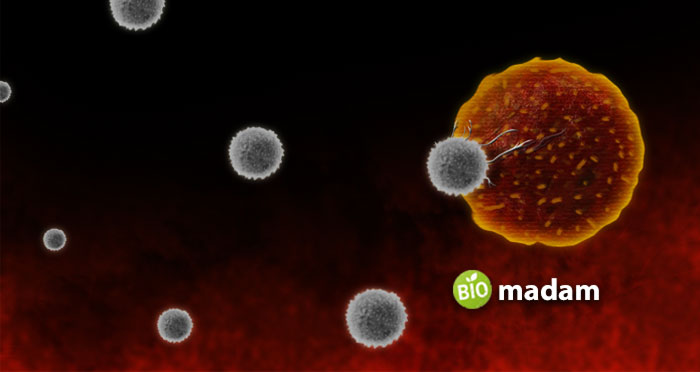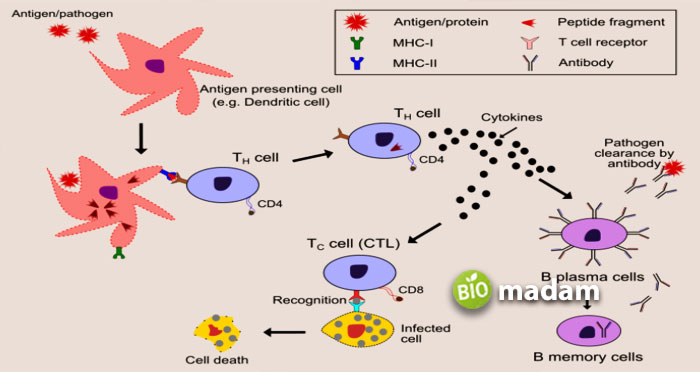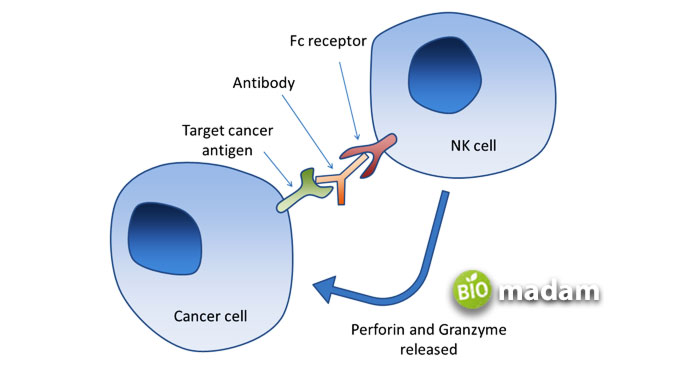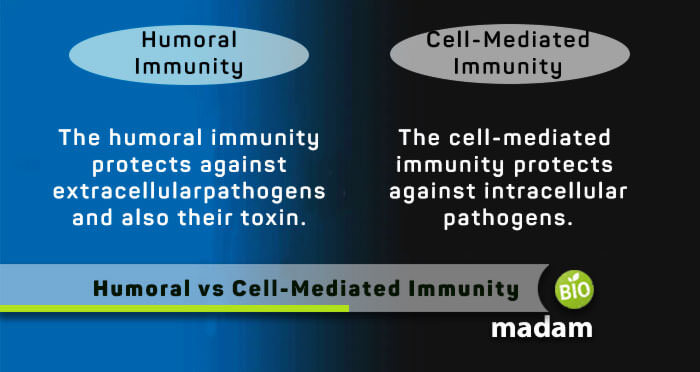Recently updated on October 5th, 2023 at 10:09 am
Immunity or the immune system is a vital body system that protects and defends the body against viruses, bacteria, and other infections.. The immune system comprises a complex network of proteins and cells that uniquely fights pathogens. Different cells work together to fight different antigens.
Passive and active immunity are two of the types of immunity in our body. Active immunity attacks antigens right after spotting them and helps keep you healthy. The two parts of active immunities are:
- Humoral immunity
- Cell-mediated immunity
Both the systems work quickly against infections, but their way of targeting and destroying the pathogens varies. To familiarize yourself with the two active immunities, their differences, and similarities, read out this article till the end, as there is a lot to learn throughout the article.
What is Humoral Immunity
Humoral immunity, also called an antibody-mediated response, works by identifying antigens in the blood circulation of lymph in the body. Antigens stimulate the production of antibodies against the immune system. So humoral immunity works against those antibodies to stop them from causing any damage.
Humoral immunity is associated with the B and T cells to identify foreign particles. Along with B cells, the antibody-mediated response takes assistance from the interleukins or helper T cells. It gets differentiated into the cells that might produce antibodies, usually the plasma B cells.

Humoral immunity is a vital part of the body as it quickly fights pathogens. It is classified as the primary defense mechanism that tries to harm the immune system with the help of antibodies produced by the B cells that bind with antigens to neutralize the external attack.
After fighting against the antigens, the B cells produce memory cells in the body. They help by providing future immunity against a similar antigen if it attacks the body again. Thus, Humoral immunity not only works in fighting against the antigen but prepares the body for defense in the future against similar kinds of attacks by extracellular microbes.
What is Cell-Mediated Immunity
Cell-mediated immunity, also known as cellular immunity, works by further destroying the infected cells by the antigen attack. It releases cytokines that help activate the T cells in the bone marrow that mature in the thymus. The activated T cells circulate in the blood and lymphoid tissue.
The helper T cells release cytokines that activate the T cells, fighting against the pathogens and antigens, and killing them from the body.
The antigen-presenting cells (APC) carry antigens on their surface along with the presence of a major histocompatibility complex (MHC). The MHC molecules are formed due to the attack of antigens which are fought by humoral immunity and are broken down.
The T cells are then activated by the cytokines released by the helper T cells. The T cells will bind with the major histocompatibility complex (MHC) and differentiate into cytotoxic T cells. The infected cells then undergo destruction, commonly known as lysis.
Cell-mediated immunity also works as a defense system and fights against intercellular pathogens. The immunity responds to all types of cells that have MHC, including cyst, tumors, pathogens, or transplanted cells.
Similarities
Cell-mediated immunity and humoral immunity have many differences, but still, their primary function is the same. They act as a defense in the body against extracellular and intracellular viruses, bacteria, fungi, molds, and other microorganisms.
- There are other similarities as well between the two that are mentioned below:
- They work against pathogens and keep the immune system safe.
- Both are active immunities.
- Humoral and cell-mediated immunity possess immunological memories.
- The two have a lag period.
- Cell-mediated and humoral immunity is not effective where the body has low natural immunity.
Difference Between Humoral and Cell-Mediated Immunity
Definition

Humoral Immunity
The humoral immune response is produced as a result of antibodies secreted by the plasma cells.
Cell-Mediated Immunity
The cell mediates immunity works by activating NK cells and macrophages leading to the production of cytotoxic T-lymphocytes
Components
Humoral Immunity
Humoral immunity comprises T cells, B cells and macrophages.
Cell-Mediated Immunity
On the other hand, cell-mediated immunity does not depend on B cells. Instead, it is regulated by many other immune cells like natural killer cells, macrophages, cytotoxic T cells and helper T cells.
Mediator
Humoral Immunity
B cells are the fundamental mediator of the humoral immune system and produce antigen-specific immunoglobulins.
Cell-Mediated Immunity
T cells are the centre of cell-mediated immunity. They depend on antigen-presenting cells to point to intracellular target antigens.
Antibodies
Humoral Immunity
Humoral immunity involves B lymphocyte antibodies to get rid of pathogens and antigens. They are produced in the bone marrow and plasma cells and give rise to different antibodies.
Cell-Mediated Immunity
Antibodies are not a part of the cell-mediated immune system. It relies on macrophages, t-cells and natural killer cells.
Pathogens
Humoral Immunity
Humoral immunity acts on bacterial pathogens that grow, reproduce and move freely within the body tissue. They are also known as extracellular pathogens.
Cell-Mediated Immunity
Cell-mediated immunity eliminates intracellular pathogens or parasites that live and reproduce within host cells.
Detectors
Humoral Immunity
Antibodies and phagocytes act as detectors in humoral immunity, giving rise to antibody-mediated immune response.
Cell-Mediated Immunity
MHC molecules and receptors detect intracellular pathogens to produce a cell-mediated immune response.
Action
Humoral Immunity
The humoral activity gives immediate action as soon as the antigen is detected by the cells.
Cell-Mediated Immunity
The immune cells in cell-mediated immunity offer a comparatively delayed response than humoral activity.
Protection Against
Humoral Immunity
Humoral Immunity protects your body majorly against extracellular bacterial or viral infections.
Cell-Mediated Immunity
Cell-mediated immunity provides added protection to fungal infections besides viral and bacterial pathogens.
Hypersensitivity
Humoral Immunity
This kind of immunity exhibits types I, II, and III hypersensitivities. It involves IgE, IgG, IgM, and immune complex responses.
Cell-Mediated Immunity
Cell-mediated immunity depicts a type IV hypersensitivity response mediated by cellular action.

Conclusion
Humoral and cell-mediated immunities are vital parts of the body and immune system. They work step by step to protect the body from external antigens or pathogens. They are both the active immune system ready to fight pathogens inside the body.
Both immunities have similarities as well as differences. The differences lie in terms of their way of fighting against pathogens. The defense system not only works by fighting against the pathogens but also prepares the body for any future attack by a similar external attack.
Humoral immunity works quickly against the pathogen and fights it. Cell-mediated immunity starts working later and fights against the infected cells by breaking the cell.

Hello, I would like to introduce myself to you! I am Chelsea Rogers, an experienced blog writer for science articles, holding an MPhil degree. My enthusiasm to grab the best knowledge, let it relate to botany, zoology, or any other science branch. Read my articles & let me wait for your words s in the comment section.


How I can express you
You are really brilliant. Thank you
May God bless you!